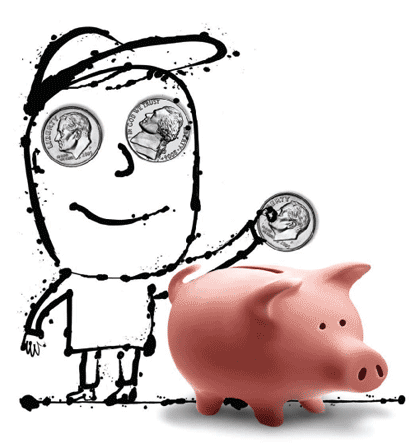 In his books and New York Times columns, Cornell economist Robert Frank has long made the case for a progressive consumption tax. In this essay, the Louis Professor of Management argues that the current economic crisis offers an opportunity for Americans to save more, spend less—and finally put an end to the escalating arms race of conspicuous consumption.
In his books and New York Times columns, Cornell economist Robert Frank has long made the case for a progressive consumption tax. In this essay, the Louis Professor of Management argues that the current economic crisis offers an opportunity for Americans to save more, spend less—and finally put an end to the escalating arms race of conspicuous consumption.
By Robert Frank
Illustrations by Miguel Davilla
A Cornell economist makes his case for finding new opportunities amid the economic wreckage

The economic bonfire fueled mostly by consumption in recent years has ended. As we watch the familiar statistics plummet, with credit cards maxed out and home-equity loans a thing of the past, the reality has slowly become clear: we won't return to the economic world of 2007 anytime soon, if ever.
But would we want to? In the boosterish world of CNBC, life without an ever-rising Dow Jones average and year-to-year gains in holiday sales figures would self-evidently forecast protracted misery. Yet matters are less hopeless than they seem. There is an easily attainable future in which we consume less than at the peak of the boom and yet still enjoy far better opportunities to construct a fulfilling life for ourselves.
Such optimism is possible if we look past traditional economic models, in which happiness depends primarily on absolute levels of consumption. These models assume, preposterously, that an investment banker remains just as satisfied with his twin-engine Cessna even after learning that his Nantucket summer neighbor commutes to the island in a Gulfstream G200. As all evidence suggests, however, satisfaction depends more on relative consumption than on absolute consumption. Most people, for example, recall being happy during their student days, even though they were living at a much lower material standard. If everyone consumes a little less for a while, most people will adapt pretty quickly.
More important, because much of our current consumption generates harmful side effects, we can gain considerable ground simply by changing the mix of things we consume. One useful step, for example, would be to slow the race for what economists call positional goods—the things people feel they need largely because others have them. Evidence suggests that across-the-board reductions in the growth of spending for such goods would cause little hardship.
One way to change spending patterns is through our tax code. In the next few years, we will need to revamp the tax system to pay not just for the ambitious plans of the current administration but also for increased debt resulting from the economic stimulus program and the deficit spending of the previous administration. Taxes do more than pay for public services. Taxing any activity both generates revenue and discourages the activity. Our current system taxes mostly useful activities, such as savings and job creation. Perversely, it also encourages us to build larger houses and drive oversize vehicles. Instead, we could switch to a system that taxes only activities that generate harmful side effects. That step alone would generate more than enough revenue to pay for President Barack Obama's ambitious proposals without requiring difficult sacrifices from anyone.
Another way to break our current consumption pattern is to get rid of wasteful spending. As economists are fond of saying, there is no free lunch—by which they mean that having more of one good thing requires making do with less of something else. An apparent exception occurs when existing arrangements are wasteful. In that case, we can have more of everything by eliminating waste.
If the rich spent less, the near-rich would spend less as well, and so on. All told, a progressive consumption tax could easily boost the nation's effective income by several trillion dollars a year.But which waste? For decades, conservatives have been cutting taxes on the promise to eliminate superfluous public programs, often by mischaracterizing ones that provide good value—as when Gov. Bobby Jindal of Louisiana recently denounced "volcano monitoring." Many conservatives are no doubt sincere in their belief that the lion's share of our economy's waste lies in the public sector. The truth, however, is the reverse. Not only is there considerably more waste in the private sector, but private waste is also far easier to eliminate than public waste.
One important form of private waste is caused by garden-variety market failures like congestion and pollution. This type of waste yields easily to simple disincentives like carbon taxes, gasoline taxes, and congestion fees.
A less widely recognized but far larger form of private waste stems from "positional arms races," which are well illustrated by the familiar metaphor in which everyone stands up to get a better view, yet no one sees any better than before. It is the same with many forms of consumption. Hedge-fund managers need a 40,000-square-foot house and Gulfstream jet only because their peers have them. Evidence suggests that if top earners all spent less on such things, their lives would be no less fulfilling than before. And like the waste that stems from pollution and congestion, the waste caused by positional arms races can be curtailed sharply by a relatively simple change in tax policy.


